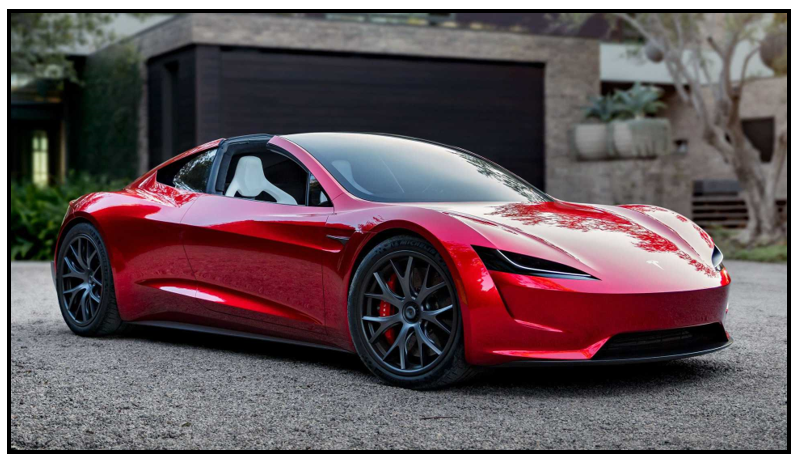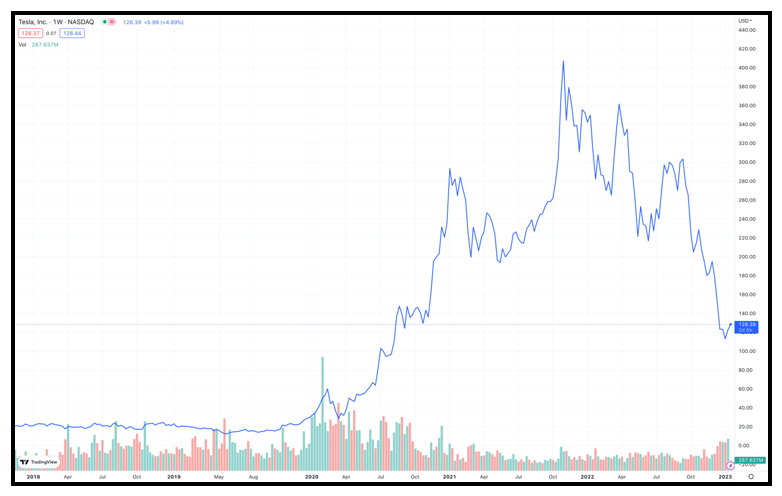Winter is coming to the global automotive sector, and unfortunately, many companies will not survive.
On Friday, executives at Tesla (TSLA) announced dramatic price cuts to its electric vehicles. Shares immediately collapsed, then rallied to near unchanged. Other vehicle stocks, however, are continuing to fall.
That’s because Tesla is coming after a bigger slice of the auto market, which means investors in legacy companies should worry.
Tesla skeptics argue that the price cuts are evidence of a demand problem, and there may be some truth to that view. The company, based in Austin, Texas, announced in December that its state-of-the-art factory in Shanghai, China, would furlough several shifts into January.

Click here to see full-sized image.
The facility produces one shiny new Tesla every 40 seconds. The implication was softening demand in Asia and Europe.
Weeks later, Tesla reported that Q4 vehicle deliveries came in at 405,000. While this number was up 40% from a year ago, it failed to meet internal growth projections of 50% year over year.
Keep in mind, sales in 2022 declined at every legacy car company with the exception of General Motors (GM), according a report at Zacks Research.
And that is where the rubber hits the road.
Related Post: Why Tesla Shares Have Swerved Off the Road
Legacy automakers are currently maintaining profitability by selling fewer vehicles. Although this may seem perverse, inventory scarcity is creating better margins and higher profitability.
When dealerships have no inventory, customers can’t haggle for lower prices. Often, they are forced to pay severe premiums to the list price, pushing the average cost of a new vehicle in the U.S. to a record $49,500.
Price gouging has been possible because legacy automakers are legitimately supply-constrained due to the ongoing shortage of older semiconductors. They are also not threatened by a viable, low-cost competitor.
Well, that all changed on Friday.
Aggressive Tesla price cuts, combined with federal tax credits, mean the entry level Model 3 sedan and its SUV cousin, the Model Y, now sell for only $36,500 and $45,500, respectively.

Click here to see full-sized image.
These vehicles offer cutting-edge performance, they are ultra-safe, have been EPA tested for the equivalent of 131 miles per gallon and new orders are expected to arrive within six weeks.
Tesla is coming after legacy automakers when there are especially vulnerable. Traditional carmakers need to keep selling expensive internal combustion engine vehicles to offset the losses they are making selling EVs. Not only is Tesla’s EV operation profitable, but its production costs are the lowest in the industry.
Cheaper Teslas help the company dramatically expand its potential market, at the direct expense of legacy manufacturers.
EVs priced at $65,000 sell into the luxury market segment, roughly 5% of the total marketplace for cars and trucks. However, a $35,000 Tesla is affordable to 25% of the global auto market of 67 million units annually.
Tesla CEO Elon Musk said in August that by 2030, Tesla production will rise to 20 million units, a 13-fold increase over 2022 levels. Reaching that lofty goal means lower price points for new Teslas and a lot of pain for competitors.
Related Post: A Big Deal for the Semi Sector
When the price cuts on Friday were announced, Tesla shares tanked immediately. Investors worried about profitability. However, by the end of the session, Tesla stock was down by only 1%. This week, the stock has soared by 7.5%.
Legacy automaker stocks have not fared nearly as well. General Motorsfell 4.8%, Ford (F) lost 5.3%, Stellantis (STLA) declined 3.6% and Toyota (TM) slipped 1.5%. The group weakness continued Tuesday.
The consensus view has always been that the legacy automakers would eventually come for Tesla market share with competitive EVs. The premise is that Tesla is simply another car company. Where this thesis fails is the possibility that Tesla might come for the whole shooting match with lower-priced vehicles.
Teslas are the most advanced and safest vehicles on the road. The company is also the most efficient manufacturer. These are huge competitive advantages.
Investors in legacy auto stocks should worry. This will not likely end well for them.
That’s it for today. I’ll be back with more soon.
All the best,
Jon D. Markman
P.S. If you enjoyed this issue and haven’t yet joined my trading service, Weiss Technology Portfolio, now is the perfect time to do so. Members of this service are currently sitting on triple-digit open gains of 265%, 254% and 211%.

